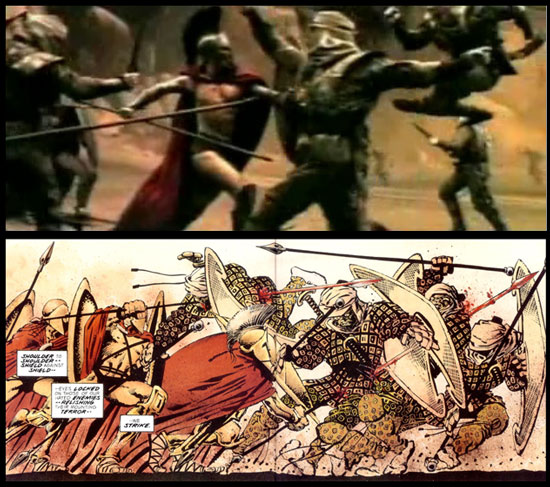300 Movie Review
Sweating it out at the Hot Gates

The title of "300," the new piece of Hollywood action porn, refers to the number of Spartan warriors who futilely but audaciously took on the Persians oh-so many centuries ago. But that number could also represent the number of stars many of the exhilarated boys would give this movie upon exiting -- "boy" being a state of mind, of course. I'm inclined to give 298 fewer. Then, sadly, I'm no longer the sort of lad who goes for souped-up remixes of, say, "Gladiator."
For fans of the Frank Miller-Lynn Varley graphic novel from which "300" has been adapted, the movie parks itself in the big manly wheelhouse of lots of filmgoers. But there's a stale, synthetic airlessness about the movie. Imagine a large cast trapped in a series of spectacular screensavers. It could be ancient Greece. It could be somebody's hard drive.
Either way, the film never feels like more than an exercise, for the filmmakers and the actors. They appear to have spent the entire production at whatever gym Hercules went to. Indeed, if you happen to enjoy spending almost two hours watching a bunch of worked-out UK thespians battle for the survival of Hellenism in only sandals, leather codpieces, and vermilion capes, run don't walk.
Written by Kurt Johnstad, Michael B. Gordon, and the director Zach Snyder, whose other movie is 2004's "Dawn of the Dead" remake, "300" brings us the mythic Battle of Thermopylae -- also known as the Hot Gates -- as narrated in a spirited storybook manner by the Spartan battler Dilios (David Wenham, an Australian).
There, in 480 BC, the Spartans try to hold off what they think is a million or so Persian invaders from entering central Greece. Sparta's King Leonidas (Gerard Butler) defies the will of the Greek people and the governing council, leading his men to their legendary doom. While Leonidas and his men are off bludgeoning for valor, his wife, Queen Gorgo (Lena Headey), remains behind both to ward off the leering insinuations of Theron (Dominic West), a scheming politico, and to urge the government to commit more troops to back her husband.
The brawling sequences have a kind of visual awesomeness. Scenes of the men slashing and impaling each other, while muscle rock plays on the soundtrack, are usually chaotically edited, but occasionally the frame slows so that the maneuvering and stabbing and leaping and linebacking operate at a dreamy clip. It's as if everybody is slaughtering everybody else underwater. (There's a sex scene that seems shot at the same speed, but the brawls are less ludicrous.)
Blending digital fakery with real athleticism, these are show-stopping sequences that deserve an ovation for the technicians, stunt coordinators, and production-design team who've brought them off. When the men aren't fighting, though, the movie is almost dead. Boredom builds up between the artificial opera of the battles like plaque.
The movie needs more of the campy bluster the Scottish Butler injects into a few scenes. Once, he chomps on an apple atop of a pile of massacred Persians. He's like Sean Connery doing Robert Duvall in "Apocalypse Now" in a chicer version of the costume Connery wore in "Zardoz." Butler gives us a flash of hunky, clunky Richard Egan in 1962's " The 300 Spartans," too. Otherwise, the movie is busy trumpeting such abstract principles as Glory, Duty, and Destiny, in speeches roared by the cast as though Herodotus himself had written them.
It's a testament to the inherent cinematic depth of Miller's graphic novels that the movies based on them are so vicariously dull. "Sin City" was like watching your buddy get a lap dance. "300" is often like watching that buddy play a video game. There's no room to breath but plenty of time to wait. And nothing seems approachably real. Even the blood is digital.
Much has been made of the allegorical potential of "300." Could Leonidas be some President Bush stand-in? Might the Persians be, well, the current Middle East? The movie could be all things to all people. For me, the fight is unfair. "300" is about a bunch of hot white metrosexuals -- those pecs, those abs, that hair -- against a million freaky nonwhite club kids. In other words, the gays. King Xerxes's hangout is full hookah-puffers, derelicts, and girls making it with girls (let's call them lesbians). His army is full of monsters seemingly from the Troma Films creature shop.
The dreaded Xerxes himself (Rodrigo Santoro) appears to be a 9-foot-tall Yul Brynner . His skin glitters. His head is totally shaved. His nails are manicured. His body is pierced and gold chains run from his scalp to his ankles. It's Yul, the mystical Miami nightclub version! During their big mano-a-mano attempt at negotiation, Xerxes tells Leonidas nothing would bring him more pleasure than for the Greek king to kneel down before him in submission. Leonidas recoils. So did the dudes next to me in the theater when Xerxes started to make his move.
According to this outrageously flagrant movie, the Spartans didn't just die for Glory, Duty, and Destiny. They died to keep the Hot Gates from turning into another gay disco.
Source Boston movie blogs
No comments:
Post a Comment